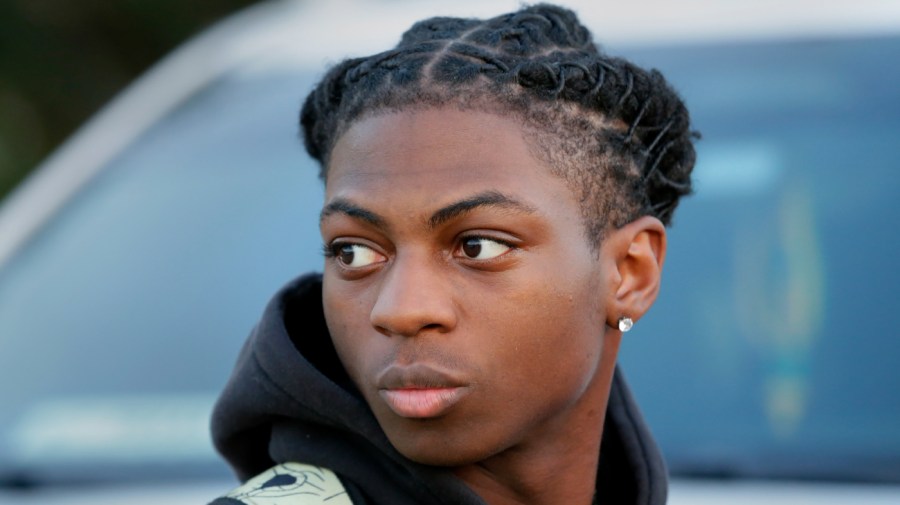(The Hill) — A bicameral host of Black lawmakers on Wednesday reintroduced legislation offering protections against hair discrimination.
Rep. Bonnie Watson Coleman and Sen. Cory Booker gathered outside the Capitol with fellow lawmakers, as well as Adjoa B. Asamoah, co-founder of the CROWN Coalition, in announcing the Creating a Respectful and Open World for Natural Hair Act, or CROWN Act.
Watson Coleman said the lawmakers were reintroducing the bill for “the simple reason that nobody — no worker, no student, no person — should ever face discrimination because of how their hair grows out of their heads.”
“We can’t control the texture of our hair any way that we can control the color of our skin,” Watson Coleman said. “And yet, Black Americans routinely face discrimination simply because of the way their hair is.”
A 2020 study from Michigan State and Duke universities found that Black women with natural hair are often perceived as less professional and less competent than Black women with straightened hair or white women with straight or curly hair. They are also less likely to be referred for job interviews.
More than 20 percent of Black women have been sent home from work because of their hair. One-third of Black women under 34 believe they have been denied a job interview because of their hair.
“Our hair plays a significant role in our overall well-being, self-esteem, cultural identity, and personal expression,” said Watson Coleman. “Discrimination against Black hair is discrimination against Black people. And we’re going to put a stop to it.”
The CROWN Act would prohibit discrimination based on an individual’s texture of hair or hairstyle that is coiled or tightly-curled, locs, cornrows, twists, braids, Bantu knots, Afros and any other style of hair commonly associated with a race or national origin in the definition of racial discrimination.
“Nobody should face harassment or discrimination based on their natural hair, and the CROWN Act is an effort to heal a systemic bias that tells Black people that who they inherently are is wrong,” said Booker.
“Prejudice against Black hair demeans an important foundation of our identity and cultural heritage,” he continued. “It’s time that the long and storied history of implicit and explicit biases against natural hair comes to an end. Black hair is beautiful in all of its forms and styles, and we must ensure individuals are free to express their cultural identities without fear of prejudice or bias.”
Rep. Steven Horsford (D-Nev.), chair of the Congressional Black Caucus, said the legislation is backed by the entire caucus.
“Whether it’s students like Darryl George, the student in Texas who has been barred from the classroom because of what is on his head instead of what’s in his head, or Black women all over our country that are being forced to change their hair in order to be accepted — whether that’s in the workplace or in any other environment — that is wrong, and it must end,” said Horsford. “It’s a direct form of racist discrimination. And it has to end, and that is what the CROWN Act is all about.”

Those gathered Wednesday were adamant that discrimination based on hair is racist.
Asamoah, co-founder of the CROWN Coalition, said that hair discrimination is based on Eurocentric beauty standards and as such is anti-Black.
“We know in many ways anti-Blackness is pervasive,” she said. “While race, the way we typically discuss, is a social construct, racism is very real and it requires a thoughtful and intentional approach to dismantle the rules and practices that reinforce it and, in this case, to mitigate the physical, psychological and economic harm caused by race-based hair discrimination.”
This is not the first time Democrats have tried to pass the legislation.
In March 2022, the House advanced a national CROWN Act legislation that later stalled in the Senate.
While no federal legislation has passed, more than 20 states have enacted a CROWN Act law.
But each state has different levels of protection, and in recent months, these disparities have made headlines.
Most notably, George, the Texas high school student, has remained on in-school suspension for his locs since August. School authorities said his locs fell below his eyebrows and ear lobes and therefore violated the district’s dress code, though George’s family disputes this. They are now suing the school district.
While Black students are disciplined at a rate four times higher than any other racial or ethnic group, research has found that 70 percent of all suspension disciplines are discretionary, with many stemming from dress code violations, including “unapproved” hairstyles.
“Our babies need to be in school climates that are nurturing and conducive to them thriving,” said Asamoah.
On Wednesday, Watson Coleman said the disciplinary action against George is not really because of a dress code violation but because “he’s a young Black man in an overwhelmingly white school district.”
The federal CROWN Act would provide research, statistics and precedent to support that there is a need to define and prohibit hair discrimination in the workplace and schools in order to enforce the protection of civil rights.
It would also provide clear definitions that describe the enforcement mechanisms of the bill.
Rep. Ayanna Pressley emphasized that the CROWN Act is also a public health act due to the health issues Black women face from chemicals applied to their hair in order to assimilate.
But, she added, it’s also about sending a message to Black Americans everywhere that they belong.
“Whether you are a student in the classroom, an employee in the workplace or the next Supreme Court justice, you belong everywhere, exactly as you are.”
This post was originally published on this site be sure to check out more of their content.







